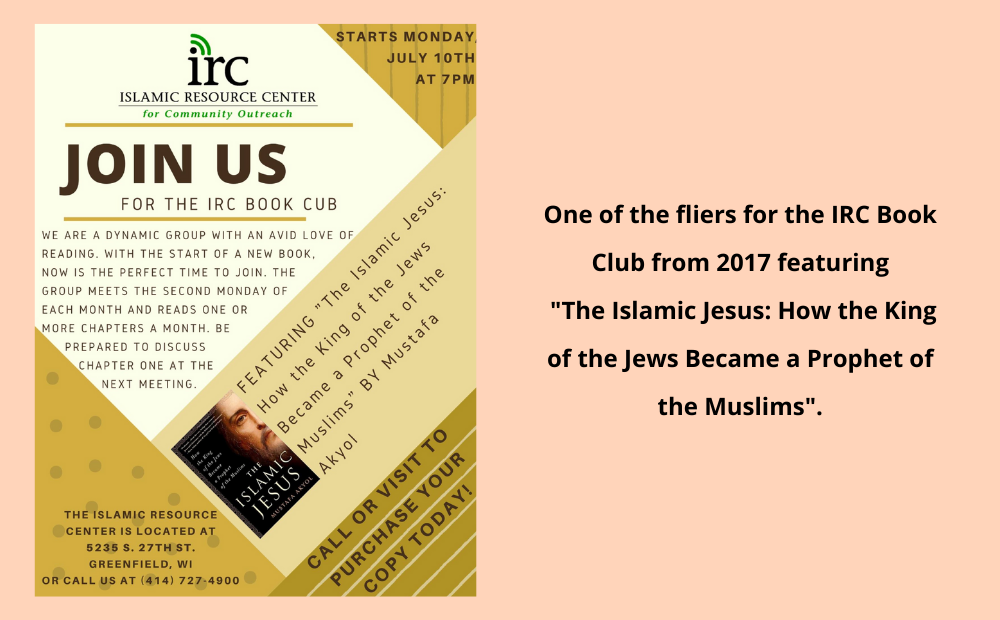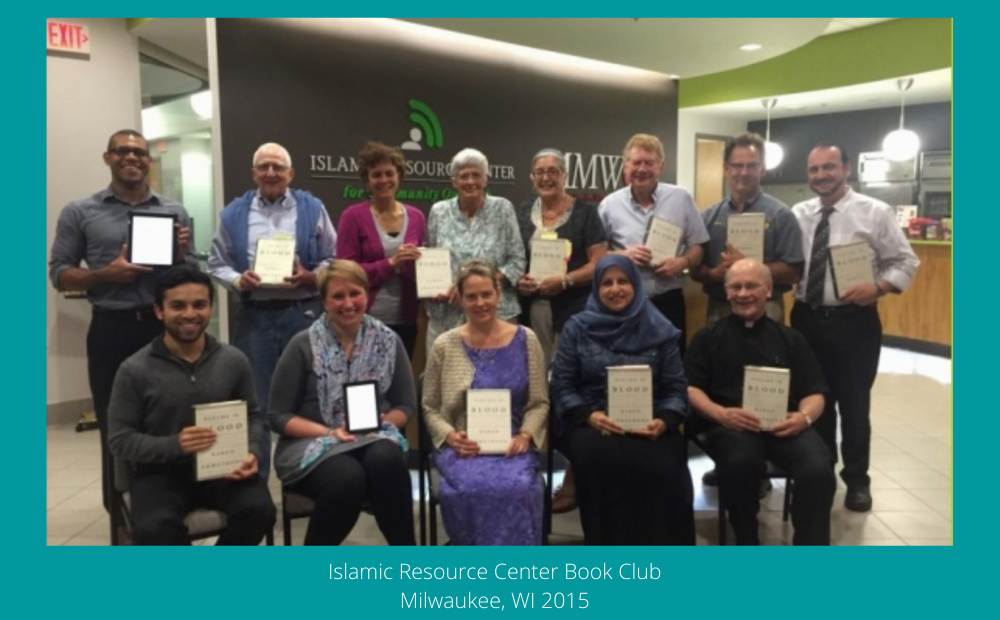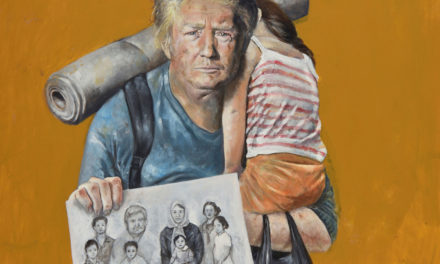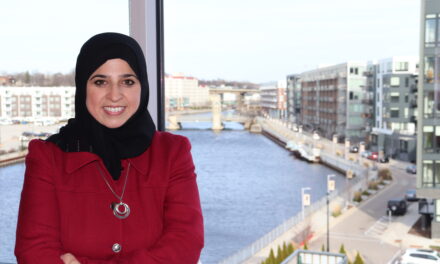Long-time regulars at the Islamic Resource Center Book Club say they keep coming back for stimulating discussions about challenging books.
“It has always been a very challenging opportunity because what we read is provocative and the people who participate are intelligent—a winning recipe,” said Dr. Robert Ashmore, Marquette University professor emeritus of philosophy. “Most of us have our own bias, prejudices, prejudgments. Every one of us needs to have those assumptions challenged occasionally.”
Now in its 11th year, the IRC Book Club meets the second Monday of every month (except Ramadan) to discuss a book selected by the group. The next meeting is Monday, June 14, when the group will discuss the national bestseller Caste: The Origins of Our Discontents (2020) by journalist Isabel Wilkerson. The nonfiction work explores racism and discrimination against American Blacks through historical and contemporary oppression, marginalization and violence, all legally maintained through systems of law and order, explains University of Nebraska assistant professor Dr. Hope Wabuke in a review for NPR.
Everyone is welcomed to attend Monday, June 14, 7 – 8 p.m., either in person at the IRC, 5235 S 27th St, Greenfield, with masks and social distancing, or virtually. Register here to attend.
“You’ll find quite a diverse group,” said Joyce Guinn of Germantown. “There are people from universities, people like me who taught high school chemistry. People of every faith. It is a very mixed group.
“Everybody is welcomed. It feels like a safe place to say what you think. You will not be disappointed. And even if you are behind in reading, you can still go and learn,” she added.
An off-shoot of the lending library
Before the IRC was established, Muslims in the greater Milwaukee area found it difficult to find books for their children that highlighted their holidays and cultural practices, said Milwaukee Muslim Women’s Coalition president and founder Janan Najeeb. The MMWC operates the IRC. “They did not find books with characters that looked like them or had names like theirs.
“And, just as important, bookstores and libraries offered very limited selections of books and information about Islam and Muslims. The information was often wrong, stereotypical or Islamophobic.” To address those concerns, the MMWC created a lending library at its IRC for use of Muslims and non-Muslims alike.
“Starting a book club was a logical choice for a library that had a mission of building bridges of understanding with the broader community,” Najeeb said. “From the time the book club began 11 years ago, 90% of the participants were and continue to be from faiths and spiritual practices other than Islam.
“The in-depth readings have generated great discussions. We are currently reading Caste, one of the few books chosen that is not on an Islamic topic. However, we felt it is relevant because the history of European colonialism and structural racism has had a deep impact on Muslim countries as well.”
In addition to monthly book club discussions, the IRC hosts author talks. After reading The Abrahamic Religions: A Very Short Introduction, book club participants and others were treated to a talk by the author Dr. Charles L. Cohen. Children’s author Hena Khan also presented a talk on her work.
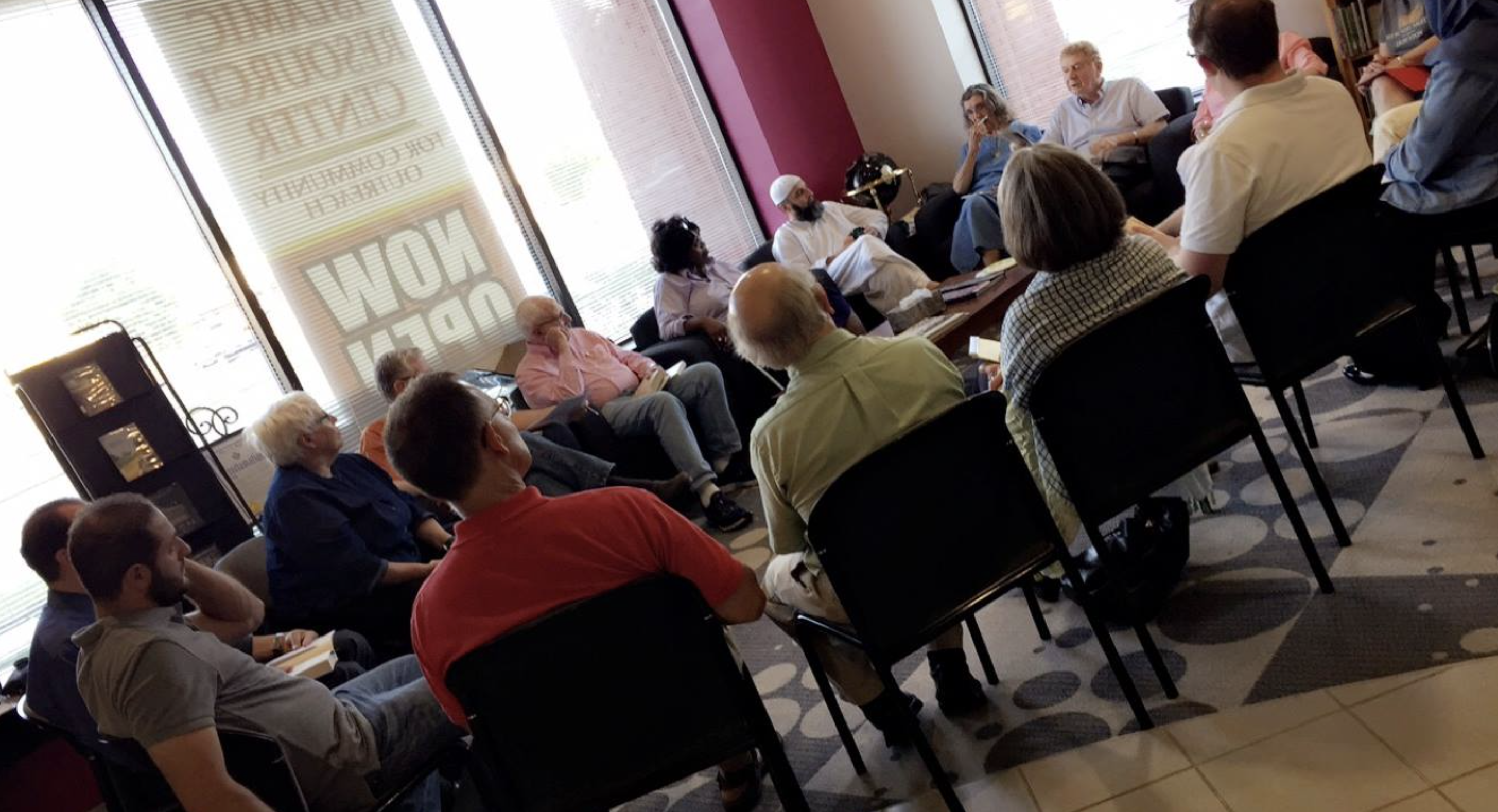
The IRC Book Club Meeting in 2016.
Challenging books, democratically chosen
“I like to learn, even at 82,” said Guinn. “The books we choose are always really challenging and never a waste of time.”
The attendees decide the next book collectively, putting suggestions on a list and then voting on their preference, Guinn said. “We only read one or two chapters of the selection for the next meeting.”
Guinn, a Catholic, particularly enjoyed discussing a book that gave an Islamic perspective on Jesus, she said. “It was very interesting to see another perspective and to see we are not that far apart.”
She said she is glad to have read books “that enlarged my thinking on the Palestinian issue. The thing that got me into that issue was really that our newspapers were not really getting the other side. I realized something was missing.
“And Caste – oh, mercy! I taught in the inner city in my years, so none of it is a surprise to me, but you can hardly believe people can treat other people that way.” Guinn taught chemistry in Milwaukee high schools for 25 years, in addition to teaching in New York state, Ohio and Michigan.
“Most of us who have been involved over the years expect the books we read and discuss will expand our experience with Islam and Islamic perceptions,” said book club regular, Fr. Philip Reifenberg, pastor of St. John the Baptist Catholic Church in Plymouth, who drives an hour each way to attend. “Sometimes we run with a particular author like Karen Armstrong – a wonderfully articulate writer. We read a couple of her books.
“We also strayed from Islam, reading books on evangelical Christianity, and racial, historical and Palestinian issues.”
“A number of times we have decided on a book with a religious theme, whether a biography about Prophet Mohammad or a historical perspective on the Crusades,” Ashmore added.
Stimulating discussion
Around 8 or 10 people usually attend each book club meeting, but popular books sometimes attract as many as 15 participants, staff said. And though the meeting is scheduled for an hour, participants sometimes have more to say and the discussions frequently continue to an hour and a half, they added.
“What I find interesting about it is that it is a multi-faceted group – Muslims, Christians, Jews, agnostics, across the board,” said Fr. Reifenberg, perhaps the only ordained practicing cleric attending regularly. “It is very much an interfaith experience.”
Former nuns, academics from Marquette and the University of Wisconsin-Milwaukee, health care professionals, government officials and educators have been among regular attendees, he said.
Ashmore and Reifenberg usually lead the discussions. Najeeb moderated initially but passed the torch. “That woman is brilliant,” said Reifenberg. “She was always able to generate the conversation in a good way without being judgmental. She’ll say something like, ‘This passage on page 4 really struck me.’ Usually, that’s all it takes to have someone else sharing an opinion and pointing out other passages.
“Sometimes it is hard to get the conversation going if the author was esoteric but, more often than not, the discussion just flows.”
No one is allowed to monopolize the conversation and everyone is encouraged to participate, Ashmore said. “I like intellectual inquiry. To mix it up with people who are well-read and concerned and address the topics we do is very pleasurable.
“One of the concepts I have been interested in is doctrinal humility,” he said. “We are good at being humble individually, but as a group, we insist our way is the right way.
“Doctrinal humility means backing off a step and trying to view the reality we are talking about through someone else’s eyes. This book club succeeds in doing that.”
“I have been very much supportive of the Milwaukee Muslim Woman’s Center,” said Ashmore. “It does important work in this community, building bridges.”
